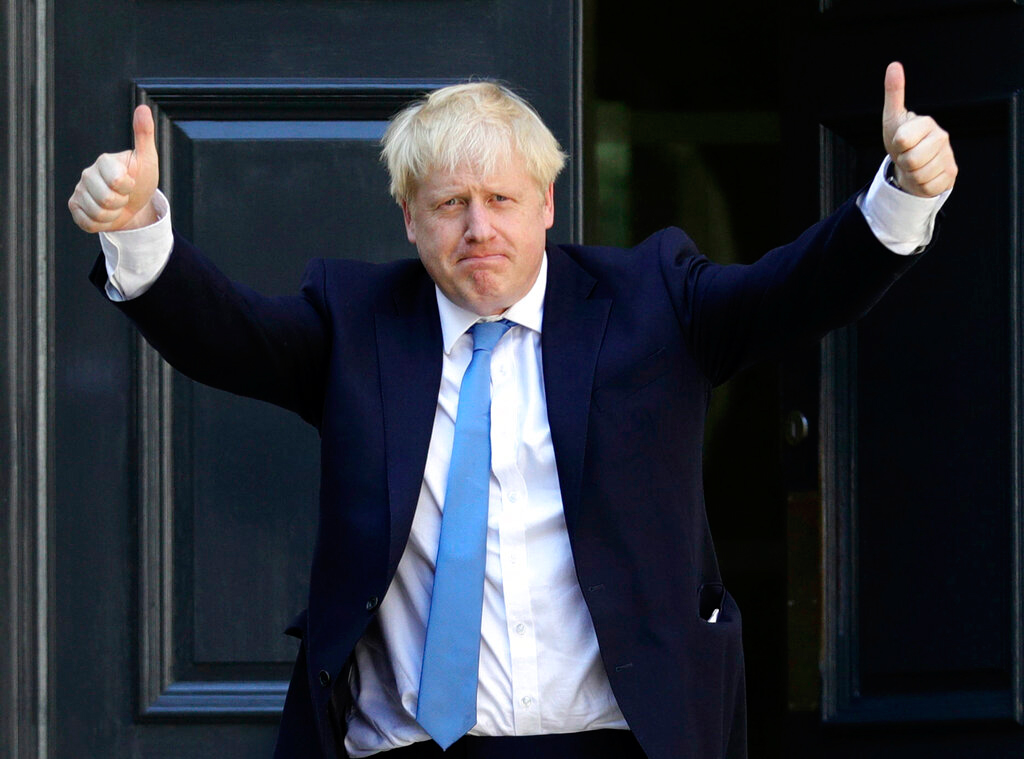How long will he last?
That was the question being asked on Tuesday after Boris Johnson, 55, won the Tory party leadership by beating his opponent, the foreign secretary Jeremy Hunt, by a margin to one.
Boris got 92,153 votes to Hunt’s 46,656, with 87.4 per cent of ballots returned from 159,320 members.
Since the Conservative party has practically lost its majority in the Commons, there are doubts whether Boris, who becomes Prime Minister on Wednesday after Theresa May goes to Buckingham Palace to submit her resignation to the Queen, will be able to achieve his declared aim of taking the UK out of the EU by October 31.
On the hottest day of the summer so far, the result of the leadership contest was announced in the Queen Elizabeth II hall in Westminster which was packed with Tory MPs, some of whom are on the way out of governments and others anticipating the offer of a ministerial job and an official limousine from the new Prime Minister.
Despite the expected result, there was still a sense of drama as the co-chairmen of the Tory 1922 committee, Dame Cheryl Gillan and Charles Walker, representing backbench MPs, took to the stage to announce the result.
Boris is expected to make a fuller speech when he enters 10 Downing Street on Wednesday, but after the result was announced he thanked both Hunt and May before referring to an article in the Financial Times: “I read in my Financial Times this morning that ... no incoming leader has ever faced such a set of daunting circumstances, it said.
“Today at this political moment in our history we again have to reconcile two sets of instincts, two noble sets of instincts, between the deep desire of friendship and free trade and mutual support in security and defence between Britain and our European partners and the simultaneous desire, equally deep and heartfelt, for democratic self-government in this country.
“Of course, some people would say that they are irreconcilable and it just can’t be done. Well I look at you this morning and I ask myself, do you look daunted? Do you feel daunted? I don’t think you look remotely daunted to me.”
He pledged: “We are going to energise the country. We are going to get Brexit done on 31 October and take advantage of all the opportunities it will bring with a new spirit of can do.
“And we know the mantra of the campaign that has just gone by, in case you have forgotten it and you probably have, it is deliver Brexit, unite the country and defeat Jeremy Corbyn – and that is what we are going to do.”
In response the Labour leader tweeted: “Boris Johnson has won the support of fewer than 100,000 unrepresentative Conservative Party members by promising tax cuts for the richest, presenting himself as the bankers’ friend, and pushing for a damaging No Deal Brexit. But he hasn’t won the support of our country.”
But this was not a day for political analysis but more an occasion when people realised history was being made.
Early arrivals at the count included Boris’s brother and sister, Jo and Rachel, and his beaming father Stanley, who said: “I feel absolutely thrilled, completely thrilled – it was a wonderful, inspiring speech, absolutely to be expected.”
There was a graceful tweet offering Boris congratulations from May, who was given a black handbag from Liberty and a Lalique necklace as leaving gifts from her departing cabinet: “We now need to work together to deliver a Brexit that works for the whole UK and to keep Jeremy Corbyn out of government. You will have my full support from the back benches.”
By the time May goes to see the Queen, several cabinet ministers, who oppose a no deal Brexit, will resign and join what could become the anti-Boris lobby in parliament.
The BBC’s chief political correspondent Vicki Young said that a “long standing ally of Boris Johnson,” and someone who supported his bid to get into Number 10, had told her that he was worried as to “how long Mr Johnson’s leadership can last”.
The editor of the Spectator, Fraser Nelson, said he was surprised that the win for Boris was not as significant as previously expected.
There were 509 rejected votes, leaving Boris to get 66.4 per cent of votes cast. Boris won by a margin of two to one, but many had expected “four to one”.
“There is going to be a very serious conflict now” in the Conservative parliamentary party, Nelson added.
Boris and Hunt apparently had a long private talk in the greenroom before the count. Hunt admitted he was “very disappointed” by the result but said Boris will be “a great prime minister”.
It is not clear whether Hunt will be sacked as foreign secretary in the middle of the Iran crisis or even serve in a Boris government: “These are all discussions that will happen over the next few days.”
On The World at One on BBC Radio 4, Times columnist and former Conservative MP Matthew Parris said a “two to one majority” of those in the Conservative Party was not representative of those in the wider population.
“He was always going to win because he’s appealing to an obsessive, ideological, extremist streak in his own national membership,” he said. “He appealed to it shamelessly and it’s won him the leadership, but it has not won him any sense of national consensus at all.”
Others argue that Boris’s margin of victory is convincing enough to allow him to appoint the cabinet that he wants. This will become clear in the next couple of days.











